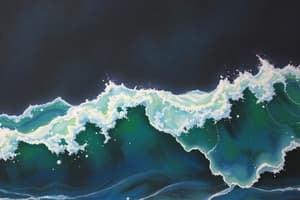Podcast
Questions and Answers
Period: __________ that it takes for a wave to repeat itself.
Period: __________ that it takes for a wave to repeat itself.
time
What is the speed of all electromagnetic waves in a vacuum?
What is the speed of all electromagnetic waves in a vacuum?
- 3 x 10^8 m/s (correct)
- 3 x 10^9 m/s
- 3 x 10^10 m/s
- 3 x 10^6 m/s
Frequency: How many __________ cycles you have in a given period of time.
Frequency: How many __________ cycles you have in a given period of time.
cycles
Only waves diffract; particles do not diffract.
Only waves diffract; particles do not diffract.
Diffraction: _______________ bending of a wave around a barrier, or through an opening in a barrier.
Diffraction: _______________ bending of a wave around a barrier, or through an opening in a barrier.
What occurs when two identical waves travel in opposite directions?
What occurs when two identical waves travel in opposite directions?
Flashcards are hidden until you start studying
Study Notes
Transverse Waves
- Transverse pulse: A disturbance that travels through a medium, with the vibration perpendicular to the direction of propagation.
- Anatomy of a transverse wave:
- Crest: The highest point of the wave.
- Trough: The lowest point of the wave.
- Equilibrium line: The line representing the resting position of the medium.
Wave Properties
- Period (T): The time it takes for a wave to complete one cycle. Units: seconds (s)
- Frequency (f): The number of cycles a wave completes in a given time. Units: Hertz (Hz)
- Relationship of Period and Frequency: Period (T) is the reciprocal of frequency (f), or T = 1/f.
Wave Interference
- Constructive Interference: When two waves meet, their amplitudes add together, resulting in a larger amplitude.
- Destructive Interference: When two waves meet, their amplitudes cancel each other out, resulting in a smaller amplitude.
Boundary Conditions
- Fixed Boundary: When a wave encounters a fixed boundary, it reflects, inverting its phase.
- Free Boundary: When a wave encounters a free boundary, it reflects, maintaining its original phase.
Standing Waves
- Formation: Standing waves are formed by the superposition of two identical waves traveling in opposite directions.
- Nodes: Points of zero amplitude on a standing wave.
- Antinodes: Points of maximum amplitude on a standing wave.
- Energy relation: The energy of a standing wave increases as its frequency increases.
Light as a Wave
- Speed of Light (c): All electromagnetic waves travel at the same speed in a vacuum, approximately 3 x 10^8 m/s.
- Relationship of Speed, Wavelength, and Frequency: The speed of light (c) is the product of its wavelength (λ) and frequency (f), or c = λf.
Diffraction
- Diffraction: The bending of waves around obstacles or through openings.
- Particles vs. Waves: Only waves exhibit diffraction. Particles do not.
Diffraction and Interference
- Constructive Interference: When crests of waves meet, they reinforce each other, resulting in a brighter light.
- Destructive Interference: When a crest of a wave meets a trough of another wave, they cancel each other out, resulting in a dimmer light.
Studying That Suits You
Use AI to generate personalized quizzes and flashcards to suit your learning preferences.




